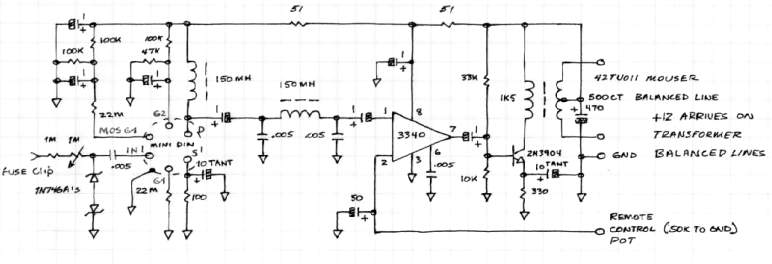
If you've looked at my schematics there's a couple of things common to both the vertical E-field and H-field loop amps. Namely the arrangement of antenna input protection, high impedance matching, high gain amplification, LC low pass filtering , remote gain control and balanced output for signal and power supply.
The choice of JFET for the vertical amplifier was arrived at by testing virtually all of the available transistors. It has high impedance input and gain, is configured for good filtering characteristics for RF signals above 10khz and gate protection via the back to back zeners. The LC low pass filtering is almost exactly taken from the BBB4 receiver by Steve McGreevy.
E-FIELD ANTENNA
AMP

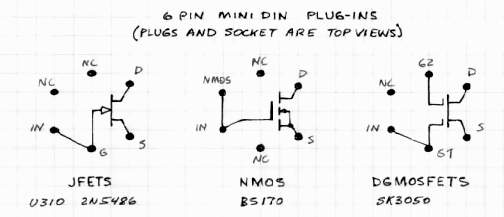 |
Using the MC3340P chip for remote gain adds a -85db to +6db control range and a lot of convenience. The output stage, although very simple, allows the signal obtained to be sent down cable in balanced fashion with good common mode rejection of hum and noise and an easy way to feed operating power to the amplifier. |
The U310 is available from RF parts company http://www.rfparts.com/ and they have a $25 minimum order policy. Other devices will certainly work. MPF102, 2N3819 and 2N5486 are good choices just note the different pinouts for each transistor.
An antenna and mount for this type of amplifier is very simple and many choices are available. The choice of loop amplifier can take several forms. The modified transistor version based on Renato Romero's loop amp as modified with LC low pass filtering and remote gain control is very good and uses commonly available transistors.
H-FIELD ANT.
AMP (V.4) Based
on R. ROMERO's amplifier modified by D. EWER for remote gain control and
600 Ohm balanced feed. 3-22-2000
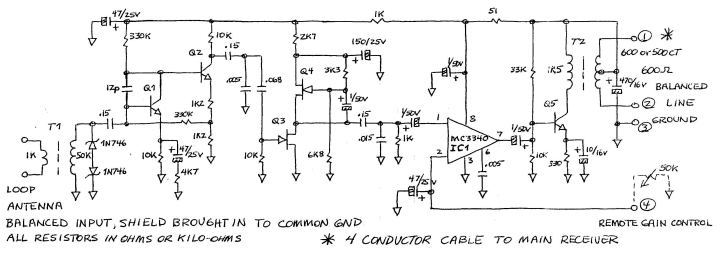
| Q1
= 2N5088 or 2N3904
Q2 = 2N3904 Q3,4 = MPF102 Q5 = 2N3904 |
T1
= Mouser 42TM117, 1k-50k Transformer loop step-up Z
T2 = Mouser 42TU011, 42TM011 or 42TM022 transformer 1.5k-600 signal out balanced and +12v in on centertap IC1 = MC3340 electronic gain control IC -85db to +6dB range. 50k to gnd remote pot. |
The AD620 version using the step-up transformer input matching and zener protection has significantly more gain and slightly better noise performance along with the filtering, gain control and balanced output. JDR Microdevices can provide this instrumentation amplifier in single lot quantity for around $8 each. The choice of antenna configuration and size is about endless.
H-FIELD ANTENNA
AMP (Version 5)
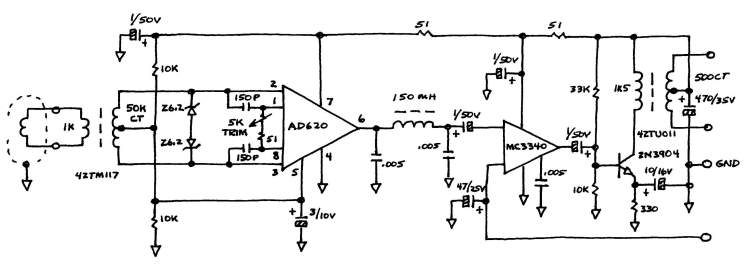
Shielded
loop antenna amp. features balanced input for loop and 500 Ohm balanced
output. AD620 amp. has gain setting trimmer, back to back zener diode protection,
PI LC low pass filter and remote gain control stage using MC3340 with -85dB
to +6dB range. 4 conductor cable provides balanced output to natrad mobile
MK4 stereo box and +12VDC and ground plus remote gain control with 50k
pot in MK4 box. D.E. 4-4-2000
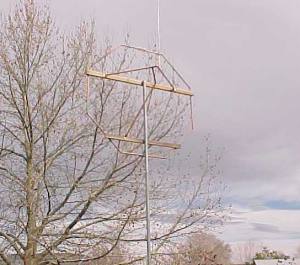 |
Will Payne's Octoloop is one of the best I've used and is very easy to construct. Information on how to build one is available at http://www.lwca.org/library/articles/ywk/octoloop.htm . Matching the loop to the AD620 is best performed using a step-up transformer in balanced fashion on input and output. Operating the amp on a single 12 volt mobile supply is accomplished easily by biasing the centertap to VCC/2 and the output can also be connected to this voltage with pin 5 or it can be connected to ground for a zero output voltage. |
Some suppression of rectified RF voltage is obtained by connecting 150 pf capacitors from both inputs to the gain control pins. Much more information on handling the AD620 is available at http://www.analog.com/adibin/quick_search .
Bringing the signals these amplifiers provide to
your vehicle is accomplished with 4 conductor cable. The choice of cable
and connectors is quite broad. My version uses surplus cable arranged in
two pairs of insulated and shielded wires with an additional bare ground
wire. All of the conductors are 22 gauge and the cable has a PVC jacket.
The plugs and jacks are from Radio Shack and are 4 conductor Microphone
units used for CB radios. The choice of box to house the balanced transformers
and power feed system can take about any form. Mouser supplied the cast
aluminum box and transformers I chose. You can also combine a tape recorder
supply for a mono or stereo cassette recorder or what have you into this
box for convenience sake. The output of the balanced transformer can be
isolated from common supply ground to feed cassette recorders. The Radio
Shack Optimus and similar units have signal ground and supply ground conflicts
so keeping the output winding isolated from ground is essential. The Marantz
stereo PMD430 has none of these ground conflicts so even with a positive
supply ground the audio inputs can be connected to the vehicle negative
supply ground. I chose to isolate both the microphone and line level outputs
to keep the equipment more flexible. Note the work is pretty much done
by the antenna amplifiers. The schematics, layouts and PCB designs are
all available or you may chose to design your own. The equipment as shown
here works very well and the portable antenna mast and the use of both
the loop and vertical antennas for stereo reception really provide a lot
more interesting approach to natural radio reception and recording. More
work is currently underway on methods to get rid of 60 hertz interference
and many of the offending harmonics. Check back from time to time for those
results and by all means offer your own ideas or improvements to these
pages. You can reach me at my email if you want more information or just
want to chat about natural radio. See at: http://www.vlf.it/directcontact/directcontact.htm
Mini MK4 Stereo
Box
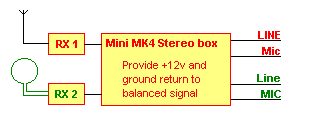 |
Mini
MK4 Stereo Box
Uses 4 conductor flat phone line and RJ11 plugs and jacks between antenna amps and box. Provides +12VDC and ground return plus 600 Ohm balanced signal input and DC isolated line and MIC level outputs for a stereo or mono recorders. All gain and filtering provided by antenna amps. By D. Ewer 4-4-2000 |
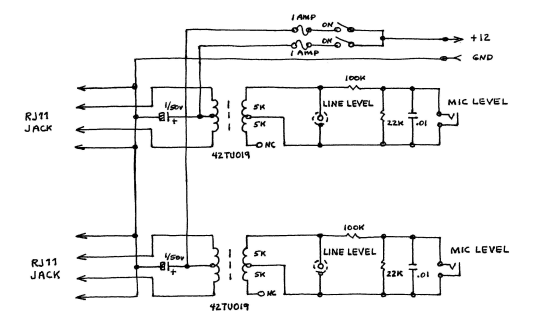
MK4 Stereo Box
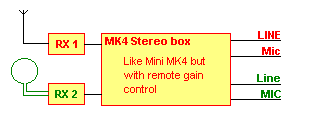 |
MK4
Stereo Box
To run 2 antennas and remote gain controlled amps. New antenna amps have all gain and filters. This box provides +12VDC and groud return plus the remote gain control and 600 Ohm balanced signal. The record outputs include line level 5 kOhm and mic level signals that are DC isolated from the vehicle system and the antenna amp. By D. Ewer 4-5-2000 |
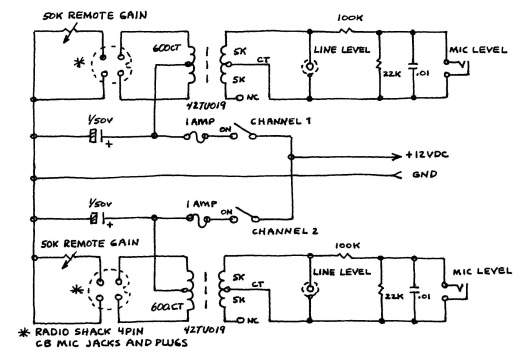
MK4 Stereo Box
and MK5 Stereo Monitor
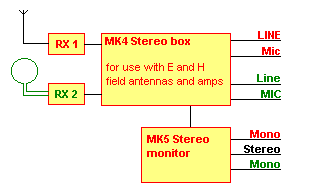 |
MK4
Stereo Box
for use with E and H field antennas and amps. Box has remote gain controlks for antenna amps and DC isolated line and MIC level outputs. Power is supplied by 12V vehicle battery and each chan. is fused and switched. A positive ground 4.5 or 6.0V recorder supply is also provided. An 8PIN DIN jack send: power and signal to a MK5 stereo monitor. Radio shack CB MIC plugs and jacks are used for power and balanced feed to antenna amps. D. Ewer 3-22-2000 MK5 Stereo
Monitor
|
MK4 inside
boards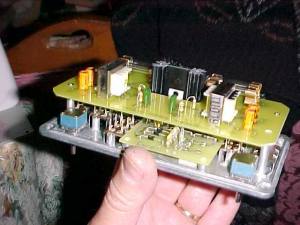 |
MK4 front
view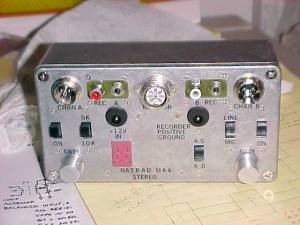 |
MK4 Front
panel back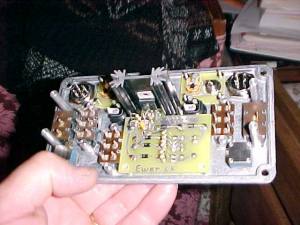 |
MK5 Stereo
Monitor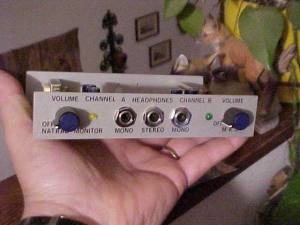 |